Bitcoin is Deflationary? That’s a Good Thing!

In this article:
We always advise that it’s best to avoid ending up in debates about Bitcoin with Keynesian economists. The risk is too high that you’ll lose a significant number of IQ points in the process!
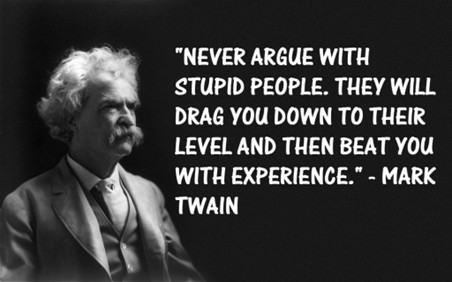
Unfortunately, despite hating Bitcoin, Keynesians can’t seem to ignore it. If they overhear you talking about it, they can’t help but insert themselves into the conversation to torture you with some of their excruciatingly bad takes.
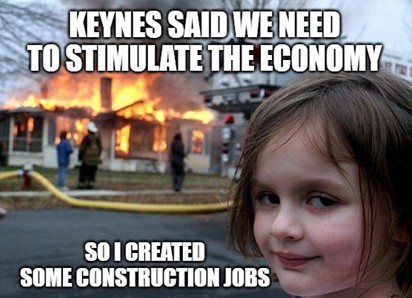
More often than not, one of these bad takes will be that Bitcoin can’t possibly work because it’s deflationary, and deflation is de-facto a ‘bad thing’.
In the simple mind of a Keynesian, deflation is always bad. They believe that if prices are always falling, consumers will delay their purchases in the expectation that they can get a better deal later. Rather than spending and stimulating the economy, deflation will cause people to hoard their money instead.

According to Keynesians, this deferred spending would force companies to reduce output and cut jobs, which in turn leads to even lower demand, and yet further downward pressure on prices.
What’s more, Keynesians also point out that deflation would cause the real value of any fixed nominal debt to increase over time. They claim that if the cost of servicing debt perpetually increases, this further contributes to a reduction in demand and spending in the economy.
In short, Keynesians are opposed to deflation because they think that falling prices will result in reduced demand from consumers, rising unemployment, and an increasing cost for servicing debt. All of which will ultimately lead us toward a ‘deflationary spiral’ where the economy grinds to a complete halt.

It certainly sounds scary! But only if you’re retarded…
Keynesians hold this view of deflation because simple minds require simple explanations. It is, however, overly simplistic, and results in an irrational fear that’s completely detached from reality.
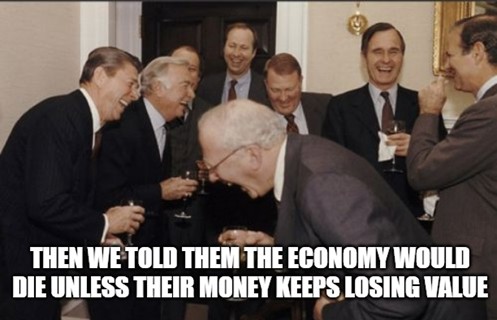
So, this week, let’s escape the children’s playpen of Keynesian economic discourse and explore why deflation isn’t as scary as they would have you believe, and why a deflationary currency like Bitcoin is actually very beneficial to both you and society at large.
Deflation – The Measure of Human Progress
Deflation isn’t an economic anomaly or some unexpected negative outcome that must be avoided. It appears simply as a logical consequence of sustained technological progress and enhanced productivity within a competitive market environment.
In layman’s terms, when we develop better technology and get more efficient at producing ‘things’, then the cost of those ‘things’ should come down naturally over time.
Life getting cheaper and easier? What a terrifying thought!

Consider transcontinental travel in the 19th century. A journey across the United States would take months by horseback or wagon and would involve substantial risk, expense and time to complete. By contrast, a modern commercial flight will allow you to cover the same distance in just a few hours at a fraction of the cost. Human progress and ingenuity made travel cheaper and more accessible.
(Despite the cost of travel getting cheaper year on year, Keynesians are at a loss to explain why people aren’t perpetually deferring their holidays).

Another good example of deflation can be seen in consumer electronics. In the 90’s a 30-inch cathode-ray tube television would cost you around $2,000, but today a far superior 85-inch 8K OLED TV would cost you somewhere in the region of $200.
Thanks to the deflation caused by technological progress, you get a TV with vastly superior resolution, connectivity and functionality at a fraction of the price. (Keynesians are again at a loss to explain why everybody now owns a TV. Surely everyone would defer their spending and wait for a cheaper future model?).
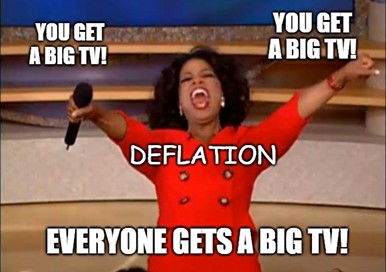
Deflation isn’t a bad thing; it’s the natural state of a well-functioning free market and the measure of human ingenuity and progress. As we get more efficient at producing the things we need, they become more accessible to everyone in the form of cheaper prices.
Keynesians would have you believe that deflation disincentivises spending to the point of stagnation, but this is alarmist nonsense. Deflation will make consumers more discerning and less likely to spend their money on useless junk they don’t need. But they won’t defer spending on items or experiences they truly want, and they can’t defer spending on things that are essential.
You’re not going to stop eating just because food prices will be lower in the future…

A deflationary environment creates a world where your savings retain and grow in value, a fixed income means your salary increases in purchasing power each year, and capital allocation improves because demand for useless products and services plummets.
To position these as bad outcomes is ridiculous.
People could work fewer hours while still maintaining a high standard of living, have more time to allocate towards things like family and culture, and prioritise good living over wanton, baseless consumerism.
Deflation isn’t a bad thing; it’s the measure of human progress.

Inflation – The Noose Around Our Neck
Keynesian economists are the useful idiots that central banks use to convince the general population that perpetual inflation is not only a good thing, but also essential to ward off the ‘terrors’ of deflation.
They want you to believe that unless your savings are constantly eroded, you will no longer participate in economic activity, instead hoarding your money and waiting indefinitely for a cheaper tomorrow.
(This is largely because Keynesians are boring, miserly people that don’t know how to enjoy life).
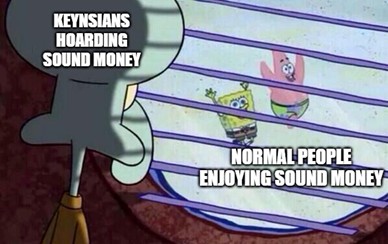
But the argument that inflation is necessary for a functioning economy is just a scam, a cruel sleight of hand performed by professional conmen.
It’s a simple lie designed to convince you that unless you let central banks perpetually steal your purchasing power by printing money, the economy will somehow collapse and people will no longer innovate, co-operate or trade with each other.
A 2% inflation target is not the level of inflation we need to have a stable economy; it’s the level of theft they think you will put up with without noticing or complaining too much.
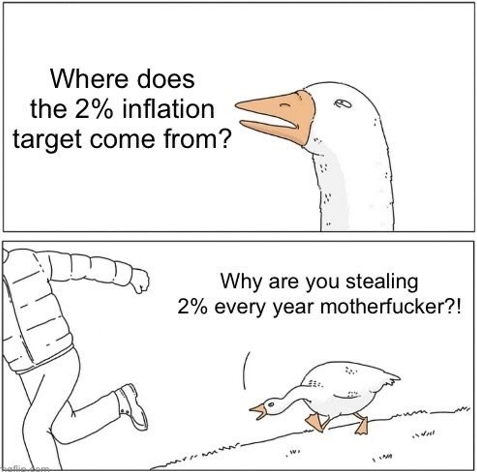
The big problem we face today is that inflation has been running a lot hotter than 2% and people are starting to notice!
The US broad money supply (M2) has expanded by over 300% since 2008, and the result has been crippling price inflation for US consumers. Housing costs have risen fivefold, college tuition tenfold, and even the cost of essentials like healthcare and food are becoming unbearable.
The benefits of warehouse automation, genome editing, and AI driven supply chain improvements doesn’t translate into cheaper consumer goods, healthcare, or groceries, because aggressive inflation simply absorbs the surplus of any deflation these advances create.
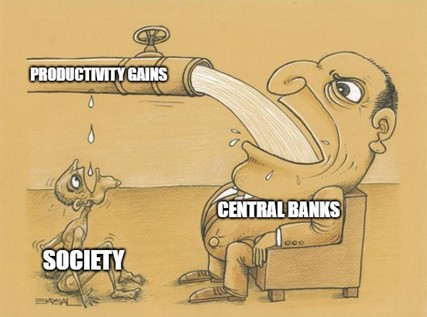
Central banks in league with corrupt politicians are strip mining all the value the system creates. Technology keeps advancing, but instead of life getting easier, and people retiring earlier, the opposite is true.
Meeting your basic needs keeps getting harder, and the next generation will be forced to keep working well into their 80’s just to keep feeding the beast.
Slavery wasn’t abolished; it was just modernised and sanitised.
Is Bitcoin Deflationary?
Satoshi designed Bitcoin to be scarce, but for the moment at least it is still an inflationary currency. Every time a new block is mined, roughly every ten minutes, 3.25 Bitcoin is newly ‘minted’ as a reward for the miner who found the block.
Technically speaking, Bitcoin’s supply is still inflating. There are however a couple of interesting things about Bitcoin’s rate of inflation that make it distinct from fiat inflation.
First, Bitcoin’s inflation rate isn’t controlled by a small group of unpredictable shaman working at the Federal Reserve. Bitcoin’s issuance rate is entirely predictable and set in stone. Anyone can predict with reasonable accuracy precisely how many Bitcoins will be in circulation at any point in time in the future.
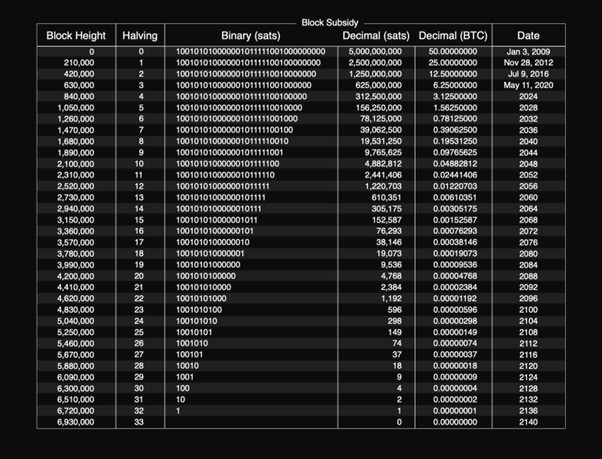
Second, Bitcoin’s rate of inflation is constantly diminishing with mining rewards being halved every 210,000 blocks until we eventually reach block 6,930,000 where Bitcoin’s hard cap will be met and the entire supply of 21 million coins will have been issued.
(To understand more about this process, check out this article: Bitcoin Halving Explained)
What this means is that eventually Bitcoin will become a truly deflationary currency. And when you consider that the private keys to a lot of Bitcoin will inevitably be lost along the way, the circulating supply will at some point start gradually diminishing.
By 2140 there will be a lot less spendable Bitcoin circulating than 21 million.
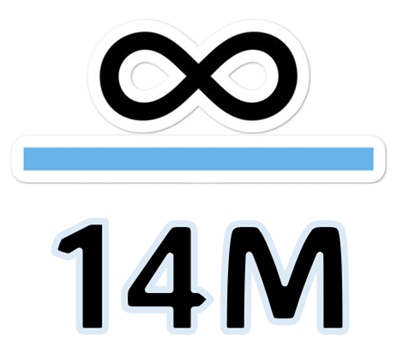
Now if you drink the Keynesian Kool-Aid and buy into the idea that deflation is a bad thing, this should be terrifying. If we adopt Bitcoin, we’re all doomed to become Gollum from Lord of the Rings, living in damp caves, hoarding our precious Bitcoin, terrified of ever parting with it.
According to Keynesian economic theory a sad future awaits us where people stack lots of UTXOs, but not a single happy memory.

Fortunately, this ridiculous argument is easily refuted by the fact that more than $35 billion of value is transacted across Bitcoin’s blockchain daily and on several occasions, Bitcoin has transmitted and settled more value in a day than the entire Visa network.
Bitcoin is currently processing around 400,000 to 500,000 transactions daily and the lightning network hit 100 million transactions in Q1 2025 (up 28% QoQ).
Thousands of businesses worldwide now accept Bitcoin for payment for everything from electronics, furniture, Xbox games, VPN subscriptions, and even airline tickets with no fiat conversion required.
People aren’t hoarding their Bitcoin, they’re spending it on luxury cars, holidays, real estate, and a whole lot of steak! Stacking Bitcoin makes it a lot easier to upgrade your lifestyle, and that’s exactly what a lot of people are doing.

The idea that people will never spend a deflationary currency is a myth. People will always want to be able to participate in society, enjoy and improve their lives, and transmit value to one another.
Ditch the dollar, adopt a Bitcoin standard and leave inflation to the Keynesians. Life’s a lot more fun when everything around you keeps getting cheaper!
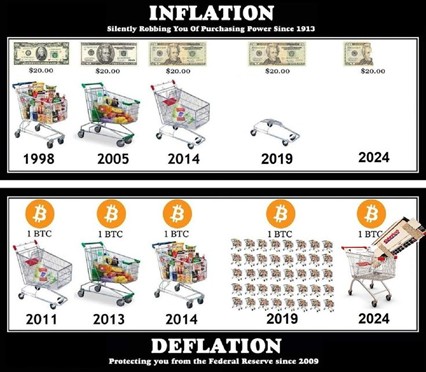
Escape Inflation - The Bitcoin Way
Discovering Bitcoin means you no longer need to subscribe to inflation being an unavoidable feature of your financial life. You can opt out from currency debasement, store your wealth in a deflationary currency, and start reaping the benefits of free market forces free from the distortion of central bankers.
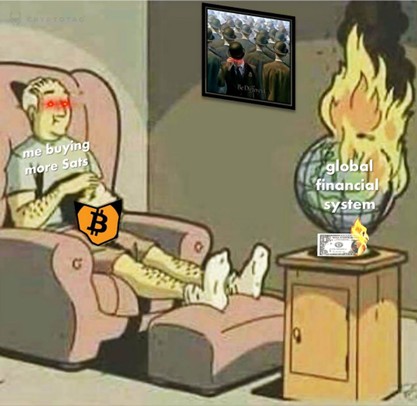
The Bitcoin economy is growing every day, and the sooner you join it, the sooner your life will start improving. The only thing between you and true financial freedom is learning how to use Bitcoin safely and securely and developing the skills to harness it to its full potential.
And that’s why we exist. Our experts are here to teach you everything you need to know from secure self-custody to online privacy. All you need to do is book a free 30-minute consultation to start your training today!
At The Bitcoin Way we don’t just talk the talk; we walk the walk. Our entire business operates on a Bitcoin standard, and we can’t wait for you to join us.
